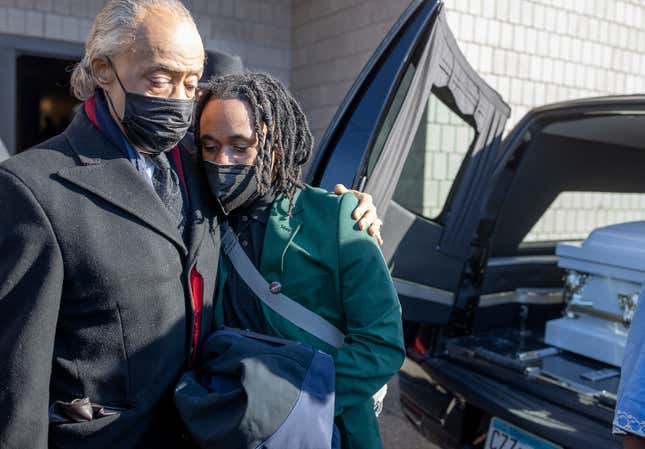
Hundreds gathered Thursday at Shiloh Temple International Ministries in Minneapolis, where 20 year-old Duante Wright, another Black man killed at the hands of Minneapolis police, was funeralized last year. This time, 22 year-old Amir Locke was the one in the casket at the altar.
“Amir was not guilty of anything but being young and Black in America,” Rev. Al Sharpton said during the eulogy, according to ABC News. “That’s why it didn’t matter that Amir’s name wasn’t on the warrant — ‘cause we don’t have a right to a name in the eyes of some in this country. We are nameless suspects.”
As The Root previously reported, Locke was swarmed by officers executing a search warrant in the early morning of Feb. 2. The officers surprised him while he was sleeping under a blanket on the couch. Locke drew his gun, which he was licensed to carry, then officers fatally shot him. Not only was his name not on the warrant, but it wasn’t even his apartment.
Locke was killed within 10 seconds of the officers’ arrival.
Mayor Jacob Frey has paused no knock warrants as activists and families of police brutality victims call for not just change, but justice. Locke’s family plans to fight for a law in the 22 year-old’s name.
“You had time to assess the situation ... but you didn’t. So you don’t need further training — you need to be fired,” Locke’s aunt, Linda Tyler, said at the funeral, according to ABC. “You ambushed my nephew, you took his life. And while he didn’t matter to you … he mattered to this whole family. He mattered to this community.”
Here’s more from the Associated Press:
Frey has imposed a moratorium on such warrants while the city reexamines its policy. The state Bureau of Criminal Apprehension is investigating Locke’s shooting.
While the funeral was happening, the House Public Safety Committee heard legislation that would significantly limit the use of no-knock warrants.
The bill, authored by Rep. Athena Hollins of St. Paul, only allows such warrants in a handful of exigent circumstances, such as kidnapping and human trafficking. It goes further than measures passed last year, which made it more difficult for officers to seek no-knock warrants.
Last year’s legislation requires that applications for no-knock warrants be approved by a chief law enforcement officer and another supervisor. It also requires officers to say whether the warrant can be executed in daytime hours and explain why officers can’t detain a suspect or search a residence by other means.
Several activists who testified in support of the new bill urged lawmakers to pass it, calling last year’s legislation a “watered down” version of what the state needs. When asked if they have spoken with Senate Republicans, they shook their heads “no.”
Family members of police brutality victims George Floyd, who was also killed in Minneapolis, and Botham Jean were also in attendance.
“We are no longer gonna be your nameless suspects,” Sharpton said. “Amir has a name. His name wasn’t on your warrant — but his name’s gonna be in your law book.”

